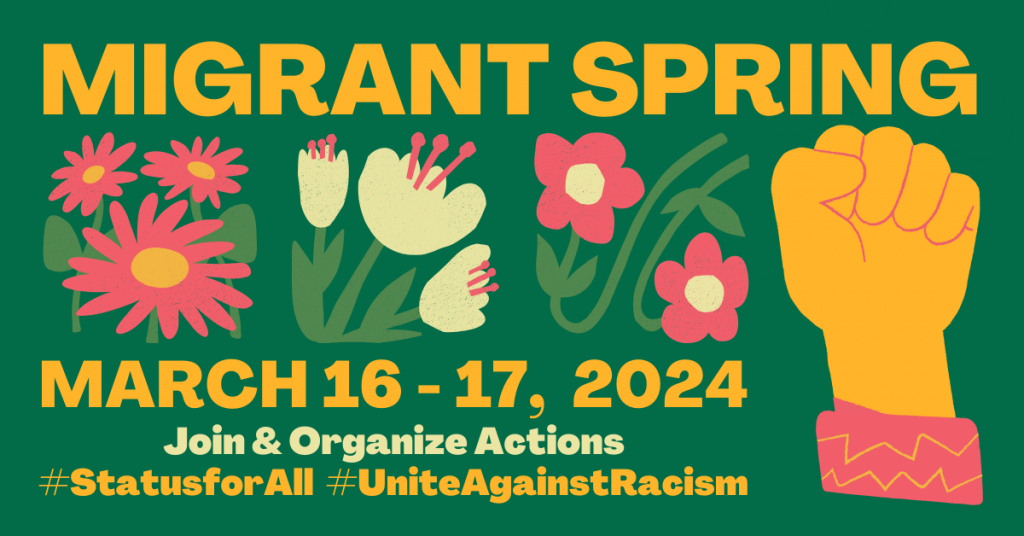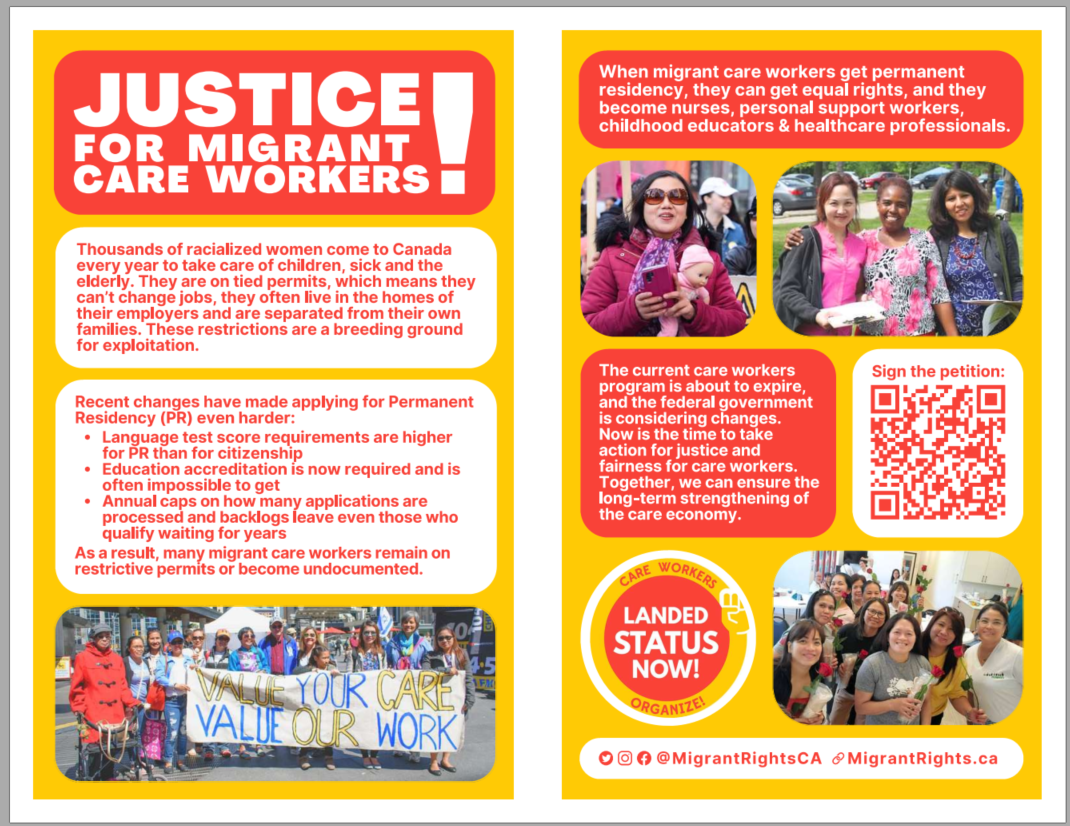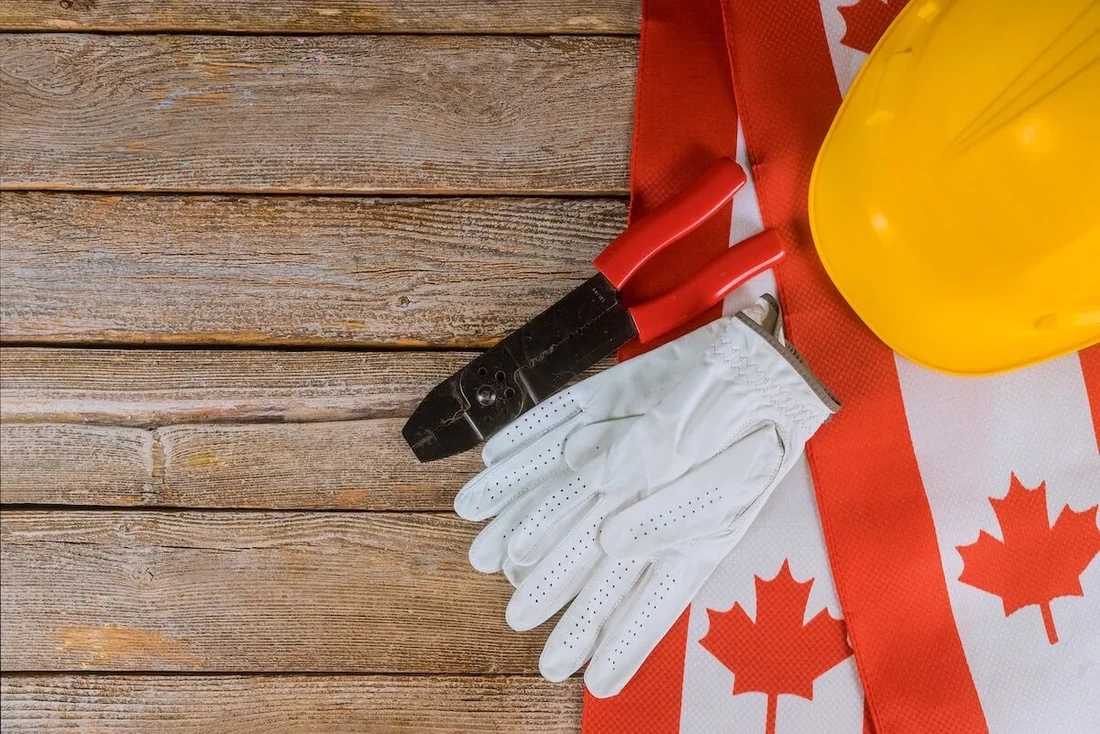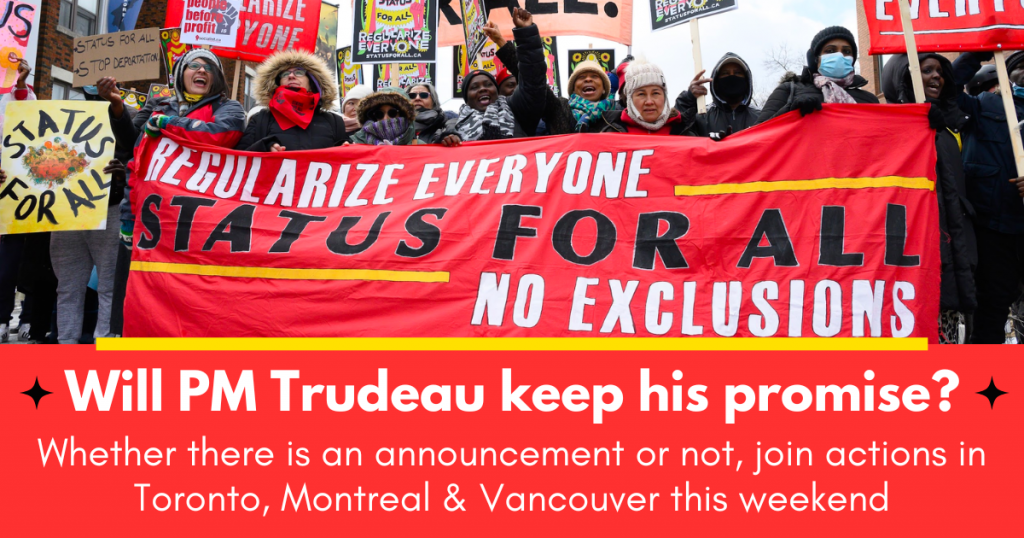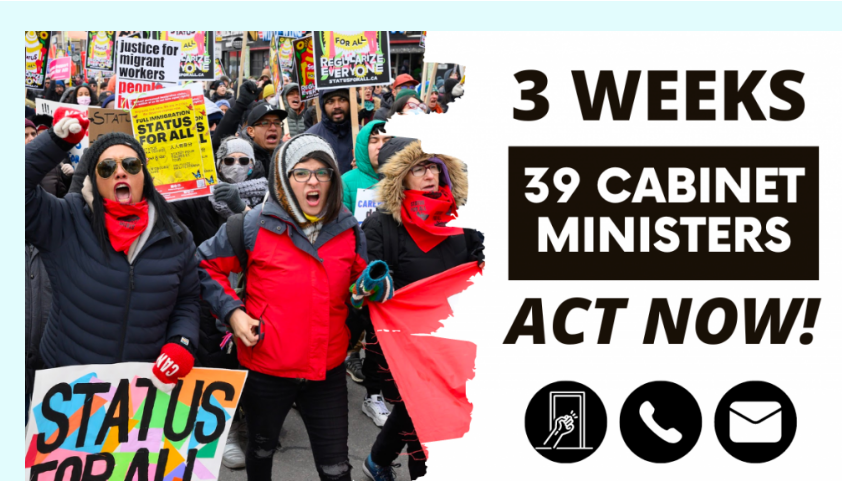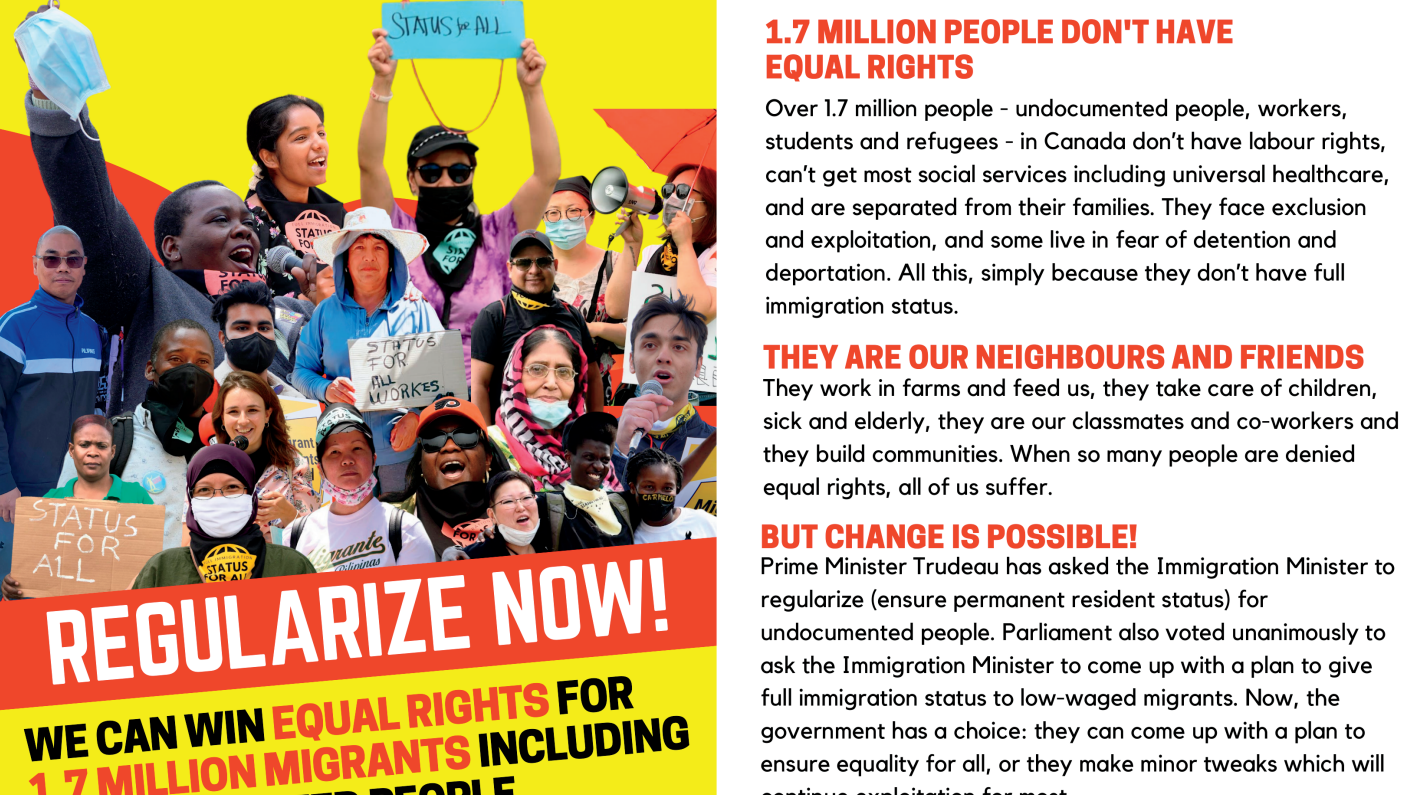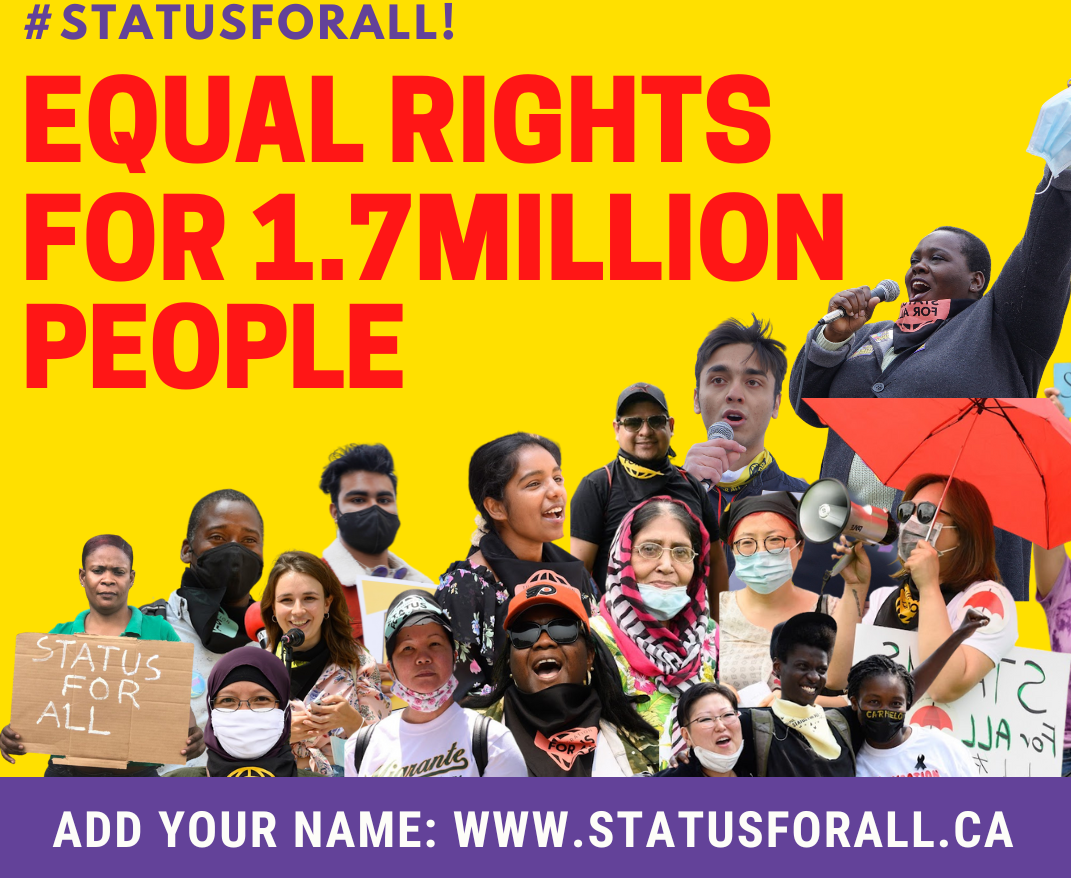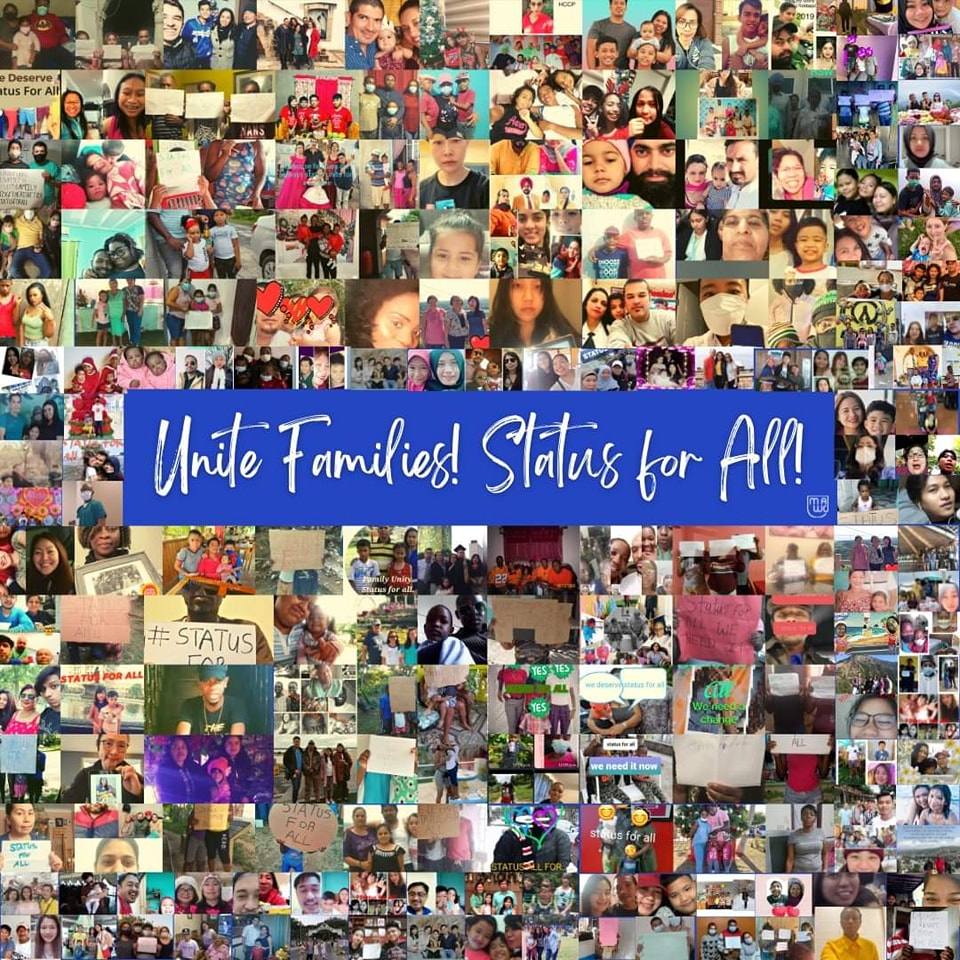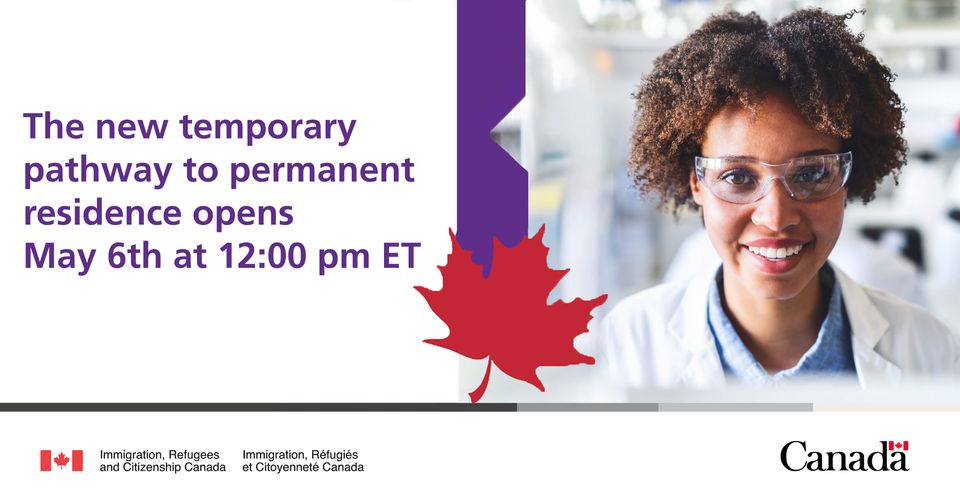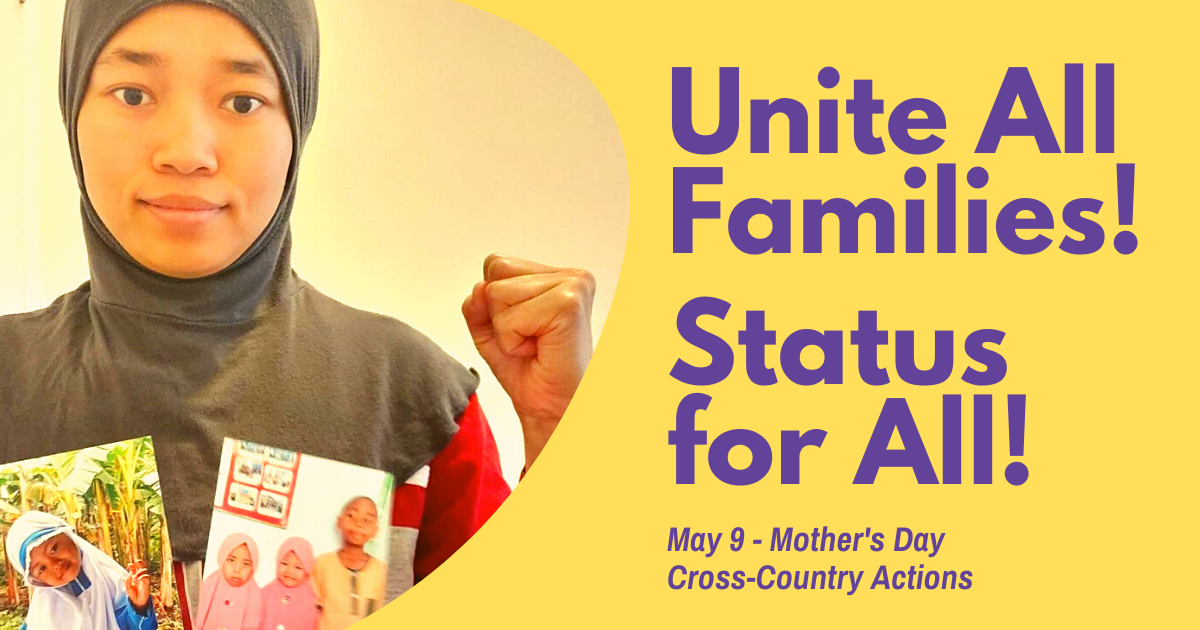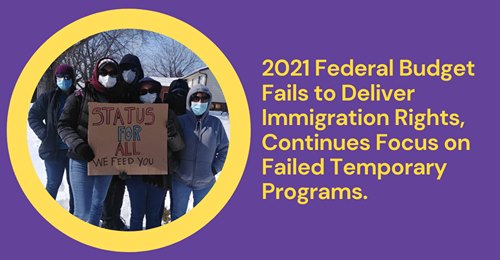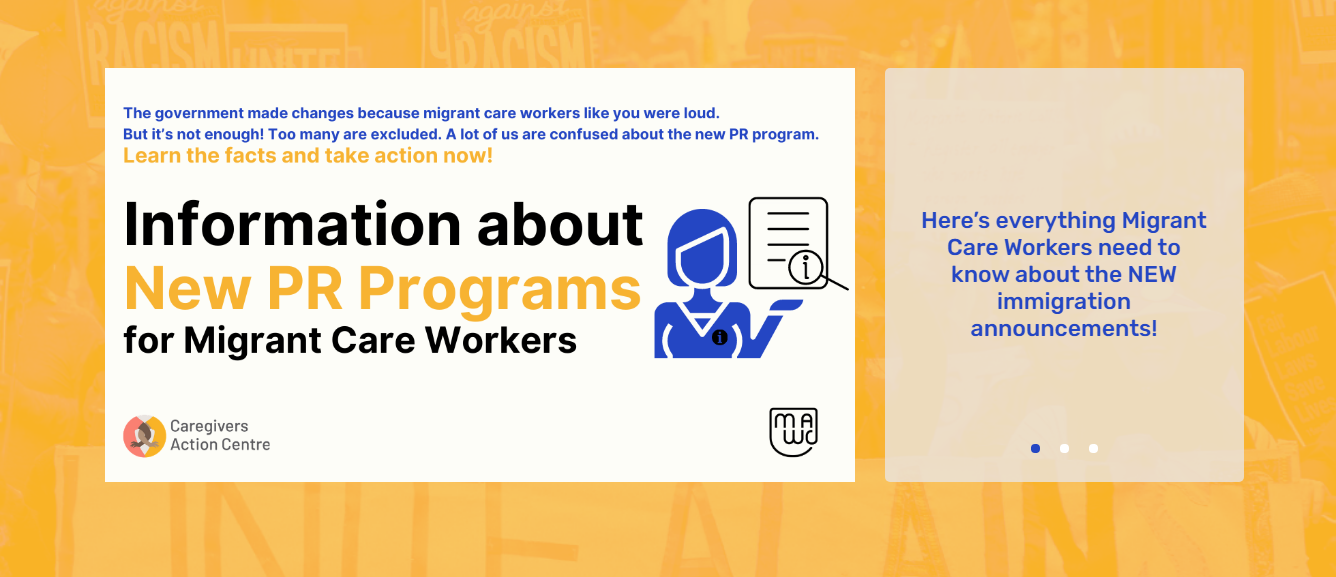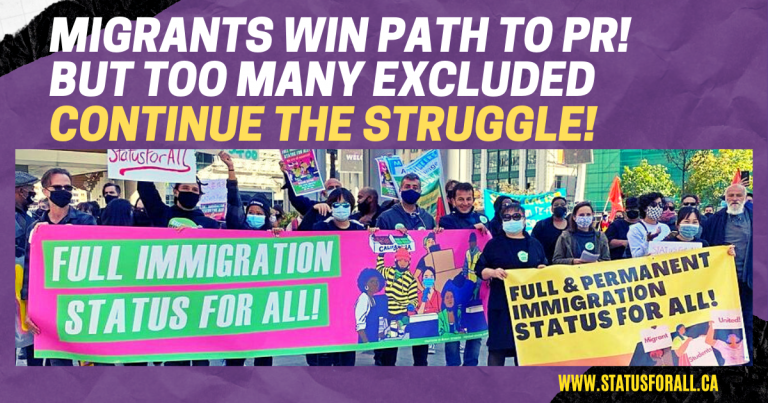|
As of June 17, 2024 , The Home Child Care Provider Pilot and the Home Support Worker Pilot ended and closed.
Immigration, Refugees and Citizenship Canada are no longer accepting new applications but will continue to process application they received on or before this date. The Home Child Care Provider Pilot and the Home Support Worker Pilot are 5-year pilot programs that let qualified caregivers and their family members come to Canada with the goal of becoming permanent residents.If you’ve been offered a job in Canada as a caregiver or have experience working in Canada as a caregiver, you may be able to apply for permanent residence through one of these pilots. The application process will be different depending on your situation and how much qualifying work experience you have. Qualifying work experienceQualifying work experience means you’ve worked full-time in Canada in 1 of these National Occupational Classification (NOC) jobs: Home child care provider (NOC 44100)
Here are the New changes to the pilots. Updated June 24, 2024 These changes are now in effect and apply to all applications being processed:
Less than 12 months in Canada If you’ve never worked full-time as a caregiver in Canada or have less than 12 months of work experience, you can apply to the Gaining experience category. 12 months or more in Canada If you’ve worked full-time as a caregiver in Canada for 12 months or more in the last 36 months, you can apply to the Direct to permanent residence category. For more information please visit IRCC website : https://www.canada.ca/en/immigration-refugees-citizenship/services/immigrate-canada/caregivers/child-care-home-support-worker.html?fbclid=IwZXh0bgNhZW0CMTAAAR10zV4te0ZneTdu
0 Comments
 Today, Immigration Minister Marc Miller announced new, upgraded caregiver pilots that will allow caregivers to continue coming to Canada while they work to make the caregiver pilot programs permanent. The new pilot programs will grant home care professionals permanent residency (PR) as soon as they arrive in Canada. They will also be able to work with organizations that provide temporary or part-time care to those who are semi-independent or recovering from an injury or illness. This new method enables caregivers to more easily find suitable work with reputable companies and gain clear, uncomplicated access to permanent resident status on-arrival in Canada. Candidates interested in working in Canada’s home care sector will be able to apply under these new pilot programs if they match the following criteria:
Miller confirmed that the pilot is expected to be launched by the end of fall 2024 or, at the latest, in early 2025. These new PR on arrival pilot initiatives represent a significant step forward in Canada’s attempts to fulfill the changing home care demands of its varied population. More information will be available prior to the pilots’ official launch, including full eligibility requirements and application instructions. For full details please visit : https://immigrationnewscanada.ca/new-canada-caregivers-pilots-marc-miller/ Spring is coming, the snow will melt, let’s get ready. Mark your calendars for March 16-17, 2024, as we launch Migrant Spring! Even in spring, working people are too worried about paying our bills to stop and smell the flowers. And we are being divided, the richest few are blaming immigrants for rising costs. But migrants live here, we have deep roots, we grow and care for our communities and are excluded from basic rights. Together, this Migrant Spring, join us to unite against racism and win equality and permanent resident status for all. Attend Actions: Actions are confirmed in Toronto, Montreal, and Vancouver and more will be added soon. RSVP on this page. Organize in Your Community: Organize an event in your own community. You can organize pickets at MP offices, letter-writing, forums and community gatherings. Register your event on this page or email us at [email protected] if you want to talk through ideas. Part of an organization? Endorse and support by clicking here. MIGRANT SPRING
This Migrant Spring, let’s reject division, poverty and inequality. Together, we will cultivate a future where everyone can thrive. For more information visit: https://migrantrights.ca 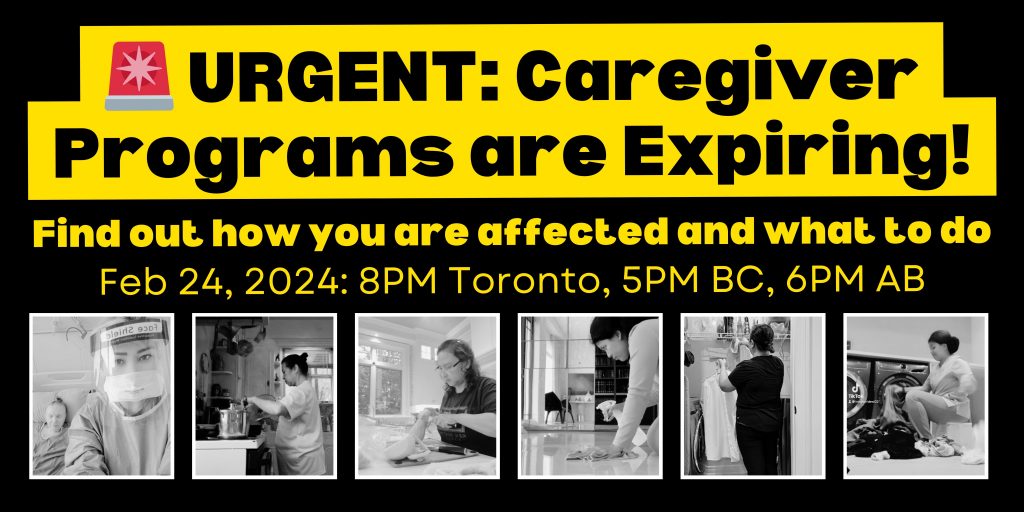 The Home Child Care Pilot and Home Support Worker Pilot Programs will expire on June 17, 2024! If you have not applied for permanent residence yet – you will be affected!
Caregivers: Join the urgent online meeting on February 24, 2024 at 8pm in Ontario / 5pm in British Columbia / 6pm in Alberta to find out your options and what we need to do to make sure you and other caregivers still have options. Many caregivers cannot apply for permanent resident status because we are unable to get high language scores or get our education accredited. If the program closes, we may be on work permits forever, renewing them year after year, separated from our families. We will be in a crisis! But there is still time! We can make a change if we move together and quickly! Register for the meeting now to find out how we can change the rules and make sure all caregivers get permanent resident status. Please register here: https://migrantrights.ca/ events/caregiverassembly/ Let us invite all care workers we know to register and attend an online Care Worker Assembly on Saturday, February 24, 2024 at 8pm in Ontario / 5pm in British Columbia / 6pm in Alberta This online Zoom assembly is for foreign care workers to talk about the expiring immigration caregiver program - the Home Child Care Provider Pilot and the Home Support Worker Pilot - and their experiences under the program. So please help us reach and invite as many foreign care workers as possible, especially those who are still under the program and/or those who lost their immigration status because of the unfair requirements of the program. Why You Should Attend:
Please don’t forget to register here: https://migrantrights.ca/ events/caregiverassembly/ Thousands of racialized women come to Canada every year to take care of children, sick and the elderly. They are on tied permits, which means they can’t change jobs, they often live in the homes of their employers and are separated from their own families. These restrictions are a breeding ground for exploitation.
|
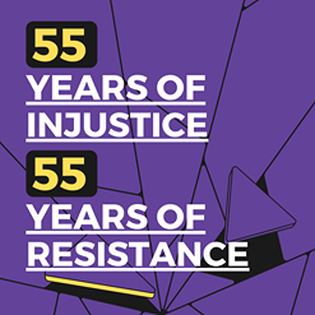 55 years. Enough is enough. Posted on March 31, 2021 Today, March 31st, is the 55th anniversary of the Seasonal Agricultural Workers Program (SAWP). Today marks over half a century of injustice, indignities and exploitation of Black and Latinx people by Canada’s agri-food industry. This brutality has always been met with organized opposition. The first recorded wildcat strike organized by migrant farm workers was in 1967, less than a year after the program was created. Today hundreds of farmworker members of Migrant Workers Alliance for Change are holding simultaneous meetings at 80+ farms to light candles of resistance and make plans to fight for Full and Permanent Immigration Status for All. You can support this massive show of worker power by sharing a photo of your own flame of resistance posting online and tagging us on Twitter, Instagram and Facebook with #StatusforAll. Speak out today and pledge to support our upcoming four days of action in 2021. SAWP followed the creation of the Caribbean Domestic Workers scheme in 1955. These two programs laid the foundation for temporariness in the immigration system. Subsequent governments have only grown these programs. Now, over 850,000 temporary study and work permits are issued in Canada each year. Most people on these programs are low-waged and racialized. We live and work here but are excluded from labour rights, healthcare, access to education and other social supports. We are separated from our families. Most of us can never get permanent residency and are forced to stay in Canada without any immigration status, and even fewer rights. Enough is enough. Today on the 55th anniversary of the SAWP program, we demand an end to temporariness. We demand an equal society and that means permanent immigration status for everyone. In 2021, we are taking actions for Status for All and we need you. Join us:
Are you with us? Go to your social media today and light your flame of resistance. PS: Following the murders in Atlanta of 8 people including Asian women sex workers, our member Butterfly: Asian Migrant Sex Worker project has launched #8CallsforJustice. Please sign on as an organization or individual: https://www.butterflysw.org/8callsforjustice Please visit : https://www.migrantrights.ca | |
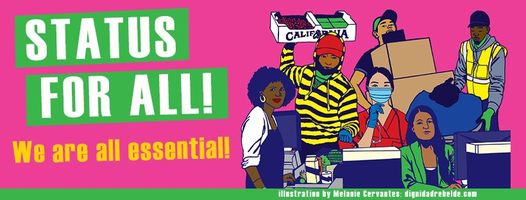
Open Letter: Full Immigration Status for All
We, the undersigned, join the Migrant Rights Network in calling for full and permanent immigration status for all, without exclusions.
COVID-19 has exposed deep inequalities in our society. The fault lines are gendered and racialized: the worst impacts are being felt by women and in Indigenous, Black and Brown communities. Those most impacted have received the least support. Meanwhile, large corporations that have already accumulated immense profits receive massive bailouts.
Migrants, refugees and undocumented people have lost work and wages during the crisis but many have been shut out of emergency income supports. Those already without wages have been abandoned. They cannot pay rent, have faced starvation, lost life savings and are sacrificing essential health care.
Others have been forced to keep working in dangerous conditions. Migrant workers on farms, in greenhouses and meat and food processing plants have been hit with massive COVID-19 outbreaks. Three migrant farm workers have already died: Juan López Chaparro, Bonifacio Eugenio Romero and Rogelio Muñoz Santos. Migrant domestic workers remain trapped in the homes of their employers, facing greater surveillance, abuse and violence. Migrant students, working in low-wage jobs in warehouses and as delivery drivers, have had their tuition fees hiked to subsidize Canadian universities and colleges.
Now, as businesses reopen, those without work have little choice but to accept unsafe jobs. But conditions are the same as before — low wages and minimal labour protections. Hard-fought gains in access to healthcare remain precarious and limited. Rent hasn’t been paid and evictions are on the horizon. With mounting debt, many are facing greater exploitation but have no way to defend themselves.
An unjust immigration system is responsible. At least one in twenty-three people (over 1.6 million people) are without permanent resident status. Migrants are punished for for leaving bad employers, doing sex work, or getting sick. Access to services varies by immigration permit and is virtually non-existent for those who have been forced out of status. Lack of permanent resident status makes it difficult, and often impossible, for migrants to speak up for their rights or access services, including those they may be eligible for, because of a well-founded fear of reprisals, termination, eviction and deportation. Migrants, refugees, and undocumented people want to take care of their families and be active members of their communities. But federal immigration rules tip the scales against them.
We call for a single-tier immigration system, where everyone in the country has the same rights. All migrants, refugees and undocumented people in the country must be regularized and given full immigration status now without exception. All migrants arriving in the future must do so with full and permanent immigration status.
Full immigration status for all is necessary for global justice. COVID-19 has ravaged communities around the world, deepening economic and political crises that are being exploited by governments. Yet, Canada has closed its borders to refugees and families remain separated. Canada must support migrants and refugees here, reunite families, and ensure that no one is forced to leave their homes.
There is a global anti-racist resurgence that is sweeping the country. Violence against, and exclusion of Black communities in particular is being challenged head on. Temporary and precarious migration is racism – it excludes racialized communities from equal rights and protections. Full immigration status for all is necessary for racial justice.
Many migrants are engaged in essential work, ensuring that families and communities are cared for. Yet the majority of this work is low-waged, and the majority of those who do it are racialized and women migrants. This work is necessary not just during a public health crisis, but to transition our economies away from the impending climate catastrophe. Bad employers use immigration status as a tool to divide and pit workers against each other – citizens against non-citizens – to keep wages low and profits high. Full immigration status for all is an essential step towards eliminating inequalities in the workplace and necessary for a transition to a just and sustainable economy of care.
We are all essential. We all deserve full immigration status.
Recovery from COVID-19 calls for a rethinking of the ways in which our communities and our economy is organized. Prime Minister Trudeau: Full Immigration Status for All is just, fair, necessary and urgent. The time is now.
visit : https://migrantrights.ca/status-for-all/
On March 16, 2020, as the COVID crisis was first hitting, we at the Migrant Rights Network called for healthcare, worker rights, income support, access to social services, and immigration status for migrant and undocumented people.
12 months later, we look back and we look ahead. With you, we vow to keep organizing and fighting for full and permanent immigration status for all.
(1) HEALTHCARE FOR ALL: As COVID-19 raged through 2020, migrants won policies in many provinces to ensure access to healthcare and COVID testing. But in many places these policies are not being implemented and migrants continue to be turned away or charged high fees for life-saving care. Today, we are calling on all provinces and the federal government to put in place concrete measures to ensure safe and dignified access without fear to COVID19 vaccinations.
(2) WORKER PROTECTIONS & INCOME SUPPORTS: As a result of our work, the Canada Emergency Response Benefit (CERB) was extended to migrants, a valid Social Insurance Number was made mandatory part way through 2020 to qualify for the Canada Recovery Benefit (CRB). Now with tax season approaching, many migrants are scared of a clawback they cannot afford. We demand a CERB/CRB amnesty.
Without income support, migrant people either faced starvation and eviction, or were forced to work in dangerous and sometimes deadly conditions. Farmworkers, care workers, delivery workers, cleaners and other low-wage workers are called ‘essential’ even as we are excluded from essential rights and protections. But we take care of us: Migrants fundraised, set up mutual aid networks and stepped in when governments failed us. Migrants stood up against bad bosses, organized strikes and raised our voices. We will continue to organize for justice and equality.
(3) STATUS FOR ALL: Fundamentally, a fair society with equal rights for all requires that everyone have the same immigration status. This is why migrants organized over 30 rallies, protests and marches calling for Full & Permanent Immigration Status for All.
In early 2020, the federal government announced a moratorium on deportations because of the pandemic. But the callous practice of deportation continues: by the end of 2020, Canada had deported more people in 2020 than in the previous 5 years. Just this week, a man who contracted COVID while in immigrartion detention was deported despite showing symptoms. Throughout, migrants organized in detention centers, and in Quebec, many secured their own release. Migrant student workers denounced government policies that punished them for the pandemic by letting their permits run out. They won new work permits, a one-time stopgap to the deportation of 52,000 people. But immigration rules continue to exclude low-waged working class people, particularly undocumented workers and those on employer controlled indentureship permits.
(4) SOCIAL SUPPORTS: While some federal, provincial and municipal supports went towards emergency food boxes, it was primarily donations from people like you that allowed migrant groups to feed communities without work. Poor and working class migrants were only able to ward off evictions, get healthcare, childcare or social supports when we united with our neighbours and co-workers to offer real solidarity in the face of deadly policies.
A year into this pandemic, let us re-commit to building a different future together. Talk to your neighbours, friends and co-workers. Raise your voice. Echo and amplify the demands of migrant and undocumented people. Let us build a just world for all of us.
Migrant Rights Network
Migrant Rights Network is Canada’s only cross-country coalition of migrant led organizations and allies with migrant and undocumented membership from coast to coast.
PS: Read and share this post from our website with links: https://migrantrights.ca/march182020/
Follow us on facebook, twitter & instagram and ask your friends to sign on at www.MigrantRights.ca
Migrant Rights Network does not take funding from political parties or corporations - chip in to support our work!
On March 16, 2020, as the COVID crisis was first hitting, we at the Migrant Rights Network called for healthcare, worker rights, income support, access to social services, and immigration status for migrant and undocumented people.
12 months later, we look back and we look ahead. With you, we vow to keep organizing and fighting for full and permanent immigration status for all.
(1) HEALTHCARE FOR ALL: As COVID-19 raged through 2020, migrants won policies in many provinces to ensure access to healthcare and COVID testing. But in many places these policies are not being implemented and migrants continue to be turned away or charged high fees for life-saving care. Today, we are calling on all provinces and the federal government to put in place concrete measures to ensure safe and dignified access without fear to COVID19 vaccinations.
(2) WORKER PROTECTIONS & INCOME SUPPORTS: As a result of our work, the Canada Emergency Response Benefit (CERB) was extended to migrants, a valid Social Insurance Number was made mandatory part way through 2020 to qualify for the Canada Recovery Benefit (CRB). Now with tax season approaching, many migrants are scared of a clawback they cannot afford. We demand a CERB/CRB amnesty.
Without income support, migrant people either faced starvation and eviction, or were forced to work in dangerous and sometimes deadly conditions. Farmworkers, care workers, delivery workers, cleaners and other low-wage workers are called ‘essential’ even as we are excluded from essential rights and protections. But we take care of us: Migrants fundraised, set up mutual aid networks and stepped in when governments failed us. Migrants stood up against bad bosses, organized strikes and raised our voices. We will continue to organize for justice and equality.
(3) STATUS FOR ALL: Fundamentally, a fair society with equal rights for all requires that everyone have the same immigration status. This is why migrants organized over 30 rallies, protests and marches calling for Full & Permanent Immigration Status for All.
In early 2020, the federal government announced a moratorium on deportations because of the pandemic. But the callous practice of deportation continues: by the end of 2020, Canada had deported more people in 2020 than in the previous 5 years. Just this week, a man who contracted COVID while in immigrartion detention was deported despite showing symptoms. Throughout, migrants organized in detention centers, and in Quebec, many secured their own release. Migrant student workers denounced government policies that punished them for the pandemic by letting their permits run out. They won new work permits, a one-time stopgap to the deportation of 52,000 people. But immigration rules continue to exclude low-waged working class people, particularly undocumented workers and those on employer controlled indentureship permits.
(4) SOCIAL SUPPORTS: While some federal, provincial and municipal supports went towards emergency food boxes, it was primarily donations from people like you that allowed migrant groups to feed communities without work. Poor and working class migrants were only able to ward off evictions, get healthcare, childcare or social supports when we united with our neighbours and co-workers to offer real solidarity in the face of deadly policies.
A year into this pandemic, let us re-commit to building a different future together. Talk to your neighbours, friends and co-workers. Raise your voice. Echo and amplify the demands of migrant and undocumented people. Let us build a just world for all of us.
Migrant Rights Network
Migrant Rights Network is Canada’s only cross-country coalition of migrant led organizations and allies with migrant and undocumented membership from coast to coast.
PS: Read and share this post from our website with links: https://migrantrights.ca/march182020/
Follow us on facebook, twitter & instagram and ask your friends to sign on at www.MigrantRights.ca
Migrant Rights Network does not take funding from political parties or corporations - chip in to support our work!
Categories
All
Action
Education
Social
Support
Archives
June 2024
February 2024
November 2023
August 2023
June 2023
April 2023
March 2023
December 2022
March 2022
July 2021
May 2021
April 2021
March 2021
January 2021
November 2020
October 2020
June 2020
May 2020
February 2020
September 2019
July 2019
June 2019
March 2019
October 2018
August 2018
May 2018
April 2018
July 2017
June 2017

